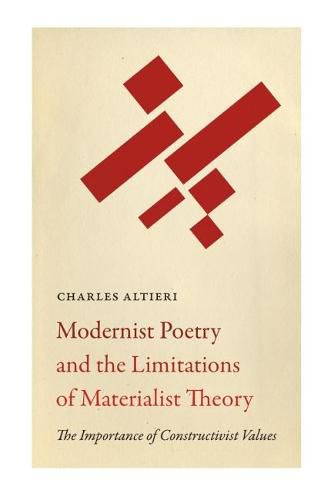Readings Newsletter
Become a Readings Member to make your shopping experience even easier.
Sign in or sign up for free!
You’re not far away from qualifying for FREE standard shipping within Australia
You’ve qualified for FREE standard shipping within Australia
The cart is loading…






In Modernist Poetry and the Limitations of Materialist Theory, Charles Altieri skillfully dissects the benefits and limitations of Materialist theory for works of art. He argues that while Materialist theory can intensify our awareness of how art can foreground sensual dimensions of experience, it does not yet serve as an adequate description of much of what we experience as mental activity–especially in the domain of art, which depends on active imaginations and constructive energies for which no Materialist theory is yet adequate. He carefully shows how constructive imaginations operate in a range of modernist poetry that is especially attentive to the mind’s powers because it provides alternatives to Impressionist sensibilities, which thrive on Materialist modes of attention. These modernists turned to versions of Hegel’s idea of the
inner sensuousness,
stressing how a work’s very construction can provide different levels of sensuousness inseparable from the work of self-consciousness.
$9.00 standard shipping within Australia
FREE standard shipping within Australia for orders over $100.00
Express & International shipping calculated at checkout
In Modernist Poetry and the Limitations of Materialist Theory, Charles Altieri skillfully dissects the benefits and limitations of Materialist theory for works of art. He argues that while Materialist theory can intensify our awareness of how art can foreground sensual dimensions of experience, it does not yet serve as an adequate description of much of what we experience as mental activity–especially in the domain of art, which depends on active imaginations and constructive energies for which no Materialist theory is yet adequate. He carefully shows how constructive imaginations operate in a range of modernist poetry that is especially attentive to the mind’s powers because it provides alternatives to Impressionist sensibilities, which thrive on Materialist modes of attention. These modernists turned to versions of Hegel’s idea of the
inner sensuousness,
stressing how a work’s very construction can provide different levels of sensuousness inseparable from the work of self-consciousness.